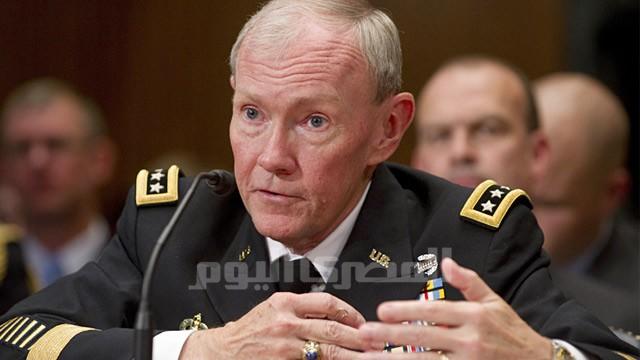
Top US military officer General Martin Dempsey insisted during a quick trip to Iraq that Washington was still playing an important role there, eight months after the last American troops departed.
Dempsey met with Iraq's Prime Minister Nuri al-Maliki and army chief of staff Lieutenant General Babaker Zebari during a six-hour stop, becoming the highest-ranking American to visit Iraq since the December 2011 pullout.
The chairman of the US Joint Chiefs of Staff said in an interview with AFP that Iraq was now a sovereign state, on an equal footing with the United States, a remark completely removed from the 2003 American-led invasion.
"We still retain significant investment and significant influence. But now it's on the basis of a partnership and not on the basis of ownership," Dempsey, who served in Iraq as a commander during the war that toppled Saddam Hussein, said before landing in Baghdad.
Clad in a formal military dress uniform instead of the combat fatigues worn during the war years, Dempsey stressed that he came to build a dialogue with his Iraqi counterparts and not to make demands.
After a 90-minute meeting with Maliki, Dempsey later told reporters the two discussed the conflict in neighboring Syria, Iraq's interest in expanding training with US forces and the purchase of American military hardware, including radar, air defense weaponry and equipment to bolster border security.
After flying over the bustling Iraqi capital by helicopter, Dempsey said he was struck by the air of "normalcy" compared to a few years ago when he served during a raging war with insurgents.
"Only eight months out, and it seems to me that they've gripped the opportunity for now that we hoped they would grip," he said en route back to Washington.
Although Iraq still faced daunting challenges, Dempsey said the country could eventually serve as a democratic model for the rest of the Middle East, which has been shaken by popular uprisings since early 2011.
Since the departure of American combat troops, however, Iraq has witnessed a protracted political stalemate, while several deadly attacks have underscored gaps in safety here despite US and Iraqi officials' insistence that local forces are able to maintain security.
Dempsey arrived from Afghanistan, where his C-17 aircraft was damaged by an insurgent rocket attack on the tarmac overnight at Bagram air base, forcing the general to use another plane for his trip to the Iraqi capital.
Asked by AFP about the rocket attack at Bagram, Dempsey smiled and shrugged, saying perhaps it was a "lucky shot" by the Taliban.
Washington is carrying out US$12 billion worth of arms and training contracts in Iraq, with the first batch of 36 F-16 fighter jets set to be delivered in September 2014.
Iraqi officials have said that while the country's police and army are capable of ensuring internal security, they will not be able to fully defend the country's borders, waters or airspace before 2020.
Iraq's ability to maintain order has come under question, however, as violence remains high here — 409 people were killed in attacks over the holy Muslim month of Ramadan.
Dempsey, however, said earlier that he would not press Maliki on reports that Iraq may be allowing Iran to ferry supplies to the Syrian regime, which has been fighting a 17-month uprising, or helping Tehran circumvent financial sanctions.
"I don't intend to ask him specifically about whether they are taking any active role in the Syrian situation."
But he said it was possible that weapons or other supplies could be smuggled across Iraq's western desert without the knowledge of the Baghdad government.
"That's absolutely feasible," said Dempsey.
Iraqi officials have repeatedly warned that Al-Qaeda fighters were likely crossing the 600 kilometer (375 mile) border with Syria, and have bolstered border security.
They have also denied helping Iran skirt international sanctions, insisting that any relations with the Islamic republic were public and transparent.
Dempsey acknowledged Iran's influence in Iraq but rejected some analysts' suggestions that Baghdad was now firmly within Tehran's orbit at the expense of the United States.




